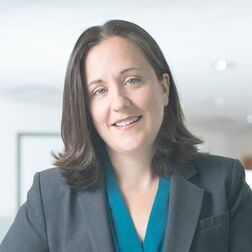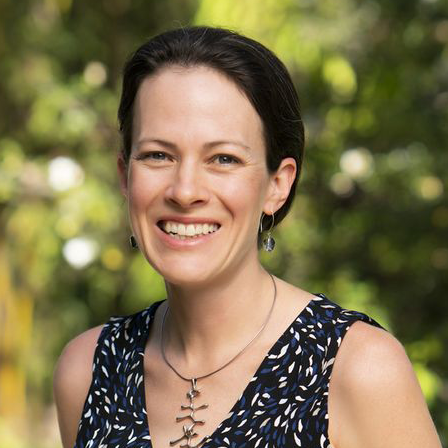Innovator Award Recipients
Meet the 2024 Recipients

Janine Kwapis, PhD
Assistant Professor and Paul Berg Early Career Professor in Biology, Pennsylvania State University
Project: Improving Cognitive Flexibility in Old Age by Fixing the Transcriptome within Memory Cells
Aging is accompanied by cognitive decline, including drastic impairments in memory. Little is understood about age-related impairments in memory updating, as most laboratory paradigms focus on initial memory formation. Using her own novel memory updating task, Dr. Kwapis’ lab recently discovered that aging impairs memory co-allocation (the process of storing linked memories in overlapping neuronal ensembles), possibly due to altered transcription within memory-storing neurons.
With support from the Innovator Award, Dr. Kwapis will test the hypothesis that aging disrupts the transcriptome within memory-storing neuronal ensembles, preventing successful memory updating in old mice. Using behavior, single cell and spatial transcriptomics, and viral cell tagging, her lab will work to determine when aging begins to affect memory updating and co-allocation, assess how aging disrupts transcription within memory-storing cells, and test whether these processes can be improved by inhibiting a key cognition-related epigenetic enzyme. Broadly, her work will identify basic biological mechanisms underlying age-related memory updating impairments, a critically understudied aspect of aging.

Sanaz Sedaghat, PhD
Assistant Professor, University of Minnesota
Project: Biological Aging Clock: A Tool to Differentiate Cognitive Aging Trajectories
As we age, our cognitive function—our ability to think, remember, and make decisions—often declines, but the rate of decline varies widely. Some people experience rapid cognitive decline, while others maintain sharp mental abilities later in life. Cognitive aging is complex and influenced by biological changes, including inflammation, cell damage, vascular dysfunction, and more. These changes can become more noticeable with age and may suggest that someone is aging faster than their actual years. Using protein data from a large, long-term study of Black and White adults, Dr. Sedaghat aims to develop "protein-based aging clocks" to measure biological age. With support from the Innovator Award, her study will explore how these clocks relate to different patterns of cognitive decline with the goal of better predicting who might experience faster cognitive aging.
Past Recipients

2023 Recipient
Denise Cai, PhD
Associate Professor, Icahn School of Medicine at Mount Sinai
Project: Memory Stability and Flexibility across a Lifetime
Aging is inevitable, but cognitive deficits may not have to be. By tracking the neural activity of hundreds of neurons in freely behaving mice as they form multiple spatial maps during young adulthood and middle age, Dr. Cai’s McKnight Innovator award will unveil how the brain stably stores and flexibly integrates memories across a lifetime. Her work will help identify biomarkers and behavioral markers that can predict age-related cognitive deficits and provide early intervention to prevent or slow age-related cognitive decline.
Dr. Cai’s lab combines cellular, circuit, and behavioral techniques to study how memories are stably stored and flexibly updated across time and experience. By studying memory-linking, or how events are connected when they occur closely in the time, she hopes to better understand memory disorders such as post-traumatic stress disorder and memory declines in aging.

2023 Recipient
Christoph Thaiss, PhD
Associate Professor, Arc Institute
Project: Counteracting Age-Associated Cognitive Decline via Gut-Brain Signaling
Aging is associated with a decline in memory function, which greatly affects quality of life for a large proportion of older individuals. The rate of cognitive decline varies widely, with some individuals retaining fully intact memories in old age and others losing the ability to participate in public life due to a dramatic inability to form and recall memories. Thus, new strategies to understand and counteract the age-associated decline in memory function are urgently needed.
With support from the Innovator Award, Dr. Thaiss’ study will explore the hypothesis that age-associated cognitive decline is not solely brain-autonomous, but regulated by body-brain pathways originating in the gastrointestinal tract. This approach provides a framework for how age-related diseases of the brain may be treated by means of peripheral intervention from the gastrointestinal tract.

2022 Recipient
Emilie Reas, PhD
Professor, University of California, San Diego
Project: The mediating role of bloodbrain barrier dysfunction in effects of systemic inflammation on brain microstructure and memory
Dr. Reas’ lab uses advanced brain imaging methods to develop biomarkers of early Alzheimer’s disease and to characterize the neurobiological changes leading to brain aging and dementia. Although inflammation and vascular dysfunction are risk factors for dementia, it remains unclear how they promote cognitive decline. Given the brain’s privileged protection from the periphery by the “blood-brain barrier,” the ways by which systemic inflammation affects the brain remains a critical unanswered question.
With support from the 2022 Innovator Award, Dr. Reas will examine relationships of blood-borne inflammatory factors with microstructural brain injury and memory, and to determine if a leaky blood-brain barrier mediates these associations. She will also evaluate whether individuals with high genetic risk for Alzheimer’s disease show stronger connections between inflammation and brain microstructure, vascular leakage, and memory impairment. Findings are expected to clarify how inflammation and vascular dysfunction accelerate brain aging, and to guide development of therapeutic approaches to optimize cognitive health with age.

2022 Recipient
Tara Tracy, PhD
Assistant Professor, Buck Institute for Research on Aging
The dynamic modulation of the synaptic connections between neurons in the brain is critical for memory. Decline in synapse function underlies memory loss in aging, but little is known about what factors make synapses more vulnerable to dysfunction with age. KIBRA (KIdney/BRAin) is a postsynaptic protein required for synaptic plasticity and memory. Genetic variation in KIBRA is associated with age-related memory deficits in older adults. Given the critical role of KIBRA protein at synapses, the amount of KIBRA expressed in the brain may modulate susceptibility to memory decline in aging.
With funding from the 2022 Innovator Award, Dr. Tracy’s lab will investigate how KIBRA levels impact synapse dysfunction and memory loss in aging. The goal of this research is to uncover mechanistic insight into the susceptibility of synapses to dysregulation in aging which could guide development of a therapeutic approach to repair synapse function as a treatment for age-related memory loss.

Lindsay De Biase, PhD
Assistant Professor, University of California, Los Angeles
Cognitive decline during aging is tightly linked to changes in the status of synapses, the connections between neurons where information is stored. Yet, the factors that regulate synapse health during aging are not well understood. Microglia are immune-like cells in the brain that respond to infection, disease, and injury. Surprisingly, these cells can also regulate the function and integrity of neuronal synapses.
With support from the Innovator Award in Cognitive Aging and Memory Loss, Dr. Biase will investigate the possibility that microglia shape synapse health during aging via modification of the extracellular matrix (ECM). The ECM is a meshwork of proteins and sugars woven tightly around neurons that potently regulates synapse stability. Recent studies and Dr. Biase's preliminary data show that microglia express numerous genes involved in building up and breaking down the ECM and that they can engulf ECM components. Dr. Biase will use multiple technical approaches to elucidate links between microglial-ECM interactions, synapse stability, and cognitive performance in aging mice and rats. The overarching goal is to identify molecular pathways for therapeutic modulation of microglial-ECM interactions to preserve cognition.

Saul Villeda, PhD
Assistant Professor, University of California, San Francisco
Identifying novel therapies to delay, and potentially reverse, age-related cognitive decline is critical given the projected increase of dementia-related disorders in an aging population. Caloric restriction counters age-related impairments in cognitive function in the aged brain. Dr. Villeda’s lab and others have shown that systemic interventions, including administration of blood plasma derived from young or exercised aged animals rejuvenates cognition at old age. The rejuvenating effects of caloric restriction mirror those observed with a youthful circulation, raising the possibility that caloric restriction similarly functions through blood factors to exert its beneficial effects.
With support from the Innovator Award in Cognitive Aging and Memory Loss, Dr. Villeda’s research will investigate the rejuvenating potential of caloric restriction-induced blood factors on the aged brain at the cellular, molecular and cognitive level. The proposed studies aim to identify molecular mechanisms that can be targeted to promote cognitive rejuvenation at old age, with clear therapeutic implications for dementia-related neurodegenerative disorders.
For more information on program eligibility and application procedures, please visit the American Federation on Aging website.
